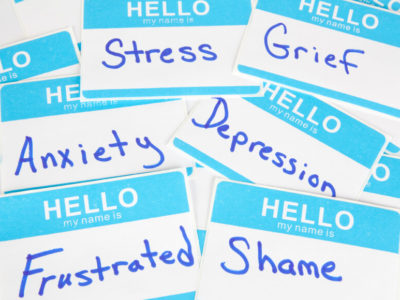Breathe in, breathe out. You’re headed off to college, and your mother won’t always be there for a good cry sesh when everything seems overwhelming. College will bring on a lot of new emotions and stressors. What if your friends want to go out drinking but you don’t? How far is too far with that cute guy from English class? It isn’t always easy to find your place in college, and often mental health struggles can arise as students deal with social stress along with academics and extracurriculars, and also trying to keep in touch with old family and friends…phew. Take a deep breath and pay attention.
Most Common Struggles Students Face
1. Anxiety
Symptoms: restlessness, muscle tension, getting tired easily, trouble sleeping, being intensely worried about things out of your control for extended periods of time
% of College Students Affected: 41.6%
Possible Treatment Options: Your psychological center at school can point you to a therapist who may even help you get some anti-anxiety meds. But if your anxiety ranges on the more social side, know that it’s okay to eat lunch alone or study in your dorm room while you’re getting help. Everyone is way too busy cramming for exams or applying to internships to judge you for taking time for yourself while you get more comfortable with the social situations that college presents.
2. Depression
Symptoms: not finding in joy in things you used to love, constantly feeling like life isn’t worth living, limited range of emotions
% of College Students Affected: 44% show some symptoms
Possible Treatment Options: Try reaching out to your school’s psychological center for a regular therapist as a preemptive action. Sometimes your depression may come and go in waves, particularly if you suffer from Seasonal Affective Disorder (SAD). Even if you only feel this way during finals week or when you’re having friend issues, it’s still good to know you always have someone you can call when these issues arise to prevent your emotions from spiraling out of control.
3. Substance Abuse
Symptoms: irritability, emotional sensitivity, loss of interest in school or friends, drinking alone, erratic or violent behavior
% of College Students Affected: 31% report symptoms of just alcohol abuse; college students are twice as likely to abuse Adderall than the general population
Possible Treatment Options: At a certain point, you might need to leave school to join a detox program, but hopefully a therapist can put you in touch with a group therapy or rehabilitation program that you can complete while you’re still taking classes.
Will people judge me if I speak out about my mental health struggles?
In college, you may find it easy to fall back into a high school mentality of that closed-in environment where everyone pays attention to what everyone else is doing. But everyone in college is so busy securing an internship or keeping their grades up that no one will judge you just for dealing with anxiety or depression. People can’t even tell that you have these struggles just by looking at you, so walk around with confidence as best you can while you deal with these problems.
Who should I talk to first?
If you’re feeling hesitant about talking to a professional, feel free to reach out to your parents or your friends, or anyone you can trust with these issues. Talking about your feelings with your support system helps. If negative emotions and excessive worrying persist, your trusted support system can ultimately help you reach out to someone trained to help you with these mental health struggles.
How many other students struggle with mental health issues?
More than you would think. One in four students struggle with mental health issues, but many statistics say that only 50% of students suffering from an illness report their negative feelings. So actually, it could be that up to half of your fellow students could feel exactly like you at least some of the time. One of the most discouraging parts of mental illness is its ability to make you feel isolated in your experience. Even if you don’t feel comfortable speaking out yet, just know that you literally are not alone in your struggles.
Are my problems really important enough?
In short, yes. I hesitated to go to therapy at the beginning of my college experience because I knew I had never been diagnosed with anxiety or depression, and I felt like I was wasting the therapists’ time when they could be dealing with “more serious” issues. But at the end of the day, only you experience your mind on the intense level that you do, and if you don’t take care of it, no one else can reach out for that help for you in the same way that you can. Your problems are important enough, no matter how big or small.
Will this affect my schoolwork and my “college experience?”
Not if you don’t let it. Especially if you attend sessions with a school-sanctioned therapist, who is required to give you a diagnosis so that you can use it when needed. For example, my therapist this year didn’t find I had anxiety or depression, but she labeled me with “adjustment issues” letting me cite this to a professor if I ever felt I needed a night off and just truly couldn’t handle the paper that night.
https://www.youtube.com/watch?v=2UPk7I7zs5M
Top 3 Mental Health Resources
1. CAPS
Many universities offer CAPS (Counseling & Psychological Services), a free Health and Wellness center whose main focus is to make sure you feel, well, healthy and well. CAPs is a useful gateway if you’re completely lost as to how you can feel better. Whether you just need to vent during a particularly stressful week or if you need help getting in contact with a more regular therapist, the helpful people in these departments will take you step-by-step through whichever process you choose while letting you in on some of the secrets of human psychology that you may not have learned in Psych 101.
2. Therapy
Once you determine how you want to fight your mental health struggles, therapy can often be a useful tool. Check to see if your school offers at least a limited number of free sessions with an on-campus therapist or can refer you to someone within walking distance of the campus. In addition, you might also decide that group therapy will ease your mind, in which you can share your own problems with students pulling the words right out of your mouth.
3. Talking to Friends and Family
Even if you don’t think you’re ready to seek formal treatment yet, seeking out your closest friends and family for guidance can never hurt. If these people are worth keeping in your life, they’ll appreciate your reaching out, and you could even become closer once you explain the reasons behind some of your behavior.
Top 3 Twitter Handles
1. Mental Health Channel — @mentalhealthcnl
.https://t.co/Mu1ycQsxtW What is the mental health channel about? Here is a short preview! #mentalhealthawareness pic.twitter.com/WveRU35ShP
— MentalHealthChannel (@mentalhealthcnl) May 8, 2016
The Mental Health Channel makes short films and documentaries that focus on people’s real-life mental health stories and struggles. If you need a quick pick-me-up to remember you’re not alone between classes, this Twitter account could brighten your day.
2. Student Health 101 — @SH_101
“How to Start an #Exercise Routine and Stick to It” from @LiveScience https://t.co/itFikwnIWZ pic.twitter.com/IBXjhgTuwY
— NIRSA (@NIRSAlive) May 21, 2016
SH 101 focuses on all aspects of student health and wellness. For example, May was Physical Fitness & Sports month. The videos and article links will help you stay well-rounded and healthy and can help you stop thinking of yourself as just someone who suffers from mental health issues, but as another person who wants to get healthy.
3. Mental Health America — @MentalHealthAm
Mistakes are just part of the process. Forgive yourself, learn, and keep going! #MondayMotivation pic.twitter.com/39AnB1bHpR
— MentalHealthAmerica (@MentalHealthAm) June 13, 2016
The Mental Health America handle promotes the largest nonprofit dedicated to mental health in the nation. If you have that social justice mindset so prevalent on college campuses, this handle can guide you toward fundraisers or articles that can really help you make a difference on a larger scale. Whether you walk to raise awareness or just retweet one of their articles, MHA can help you help others.
Get More Mental Health Tips from Experts and Students:
Why I Spoke Out About My Mental Health Struggles

A Love Letter to My Ex about My Mental Health Struggles

7 Steps to Becoming Your Own Mental Health Hero




















